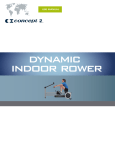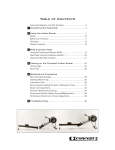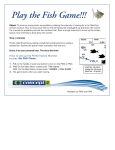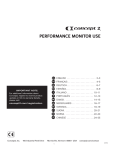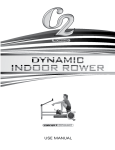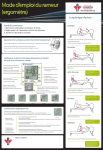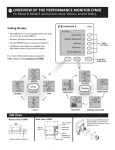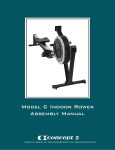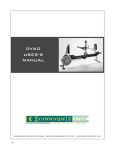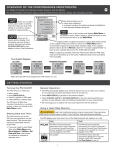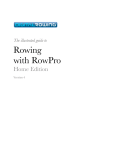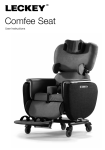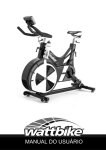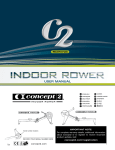Download Model D Owners Manual
Transcript
ASSEMBLY ® CONCEPT2 INC. MORRISVILLE, VERMONT USA 05661 E-MAIL:[email protected] WEB: WWW.CONCEPT2.COM 800.245.5676 TABLE OF CONTENTS ASSEMBLY USING THE INDOOR ROWER Unpacking your Concept2 Indoor Rower . . . . . . . . . . . . . . . . .2 Assembling the Front Leg . . . . . . . . . . . . . . . . . . . . . . . . . . . .3 Attaching the Front Leg . . . . . . . . . . . . . . . . . . . . . . . . . . . . . .4 Assembling & Installing the Frame Lock . . . . . . . . . . . . . . . . .5 USING THE INDOOR ROWER DESIGNING YOUR ROWING PROGRAM Attaching & Detaching the Monorail. . . . . . . . . . . . . . . . . . . . .6 Safety . . . . . . . . . . . . . . . . . . . . . . . . . . . . . . . . . . . . . . . . . . . .8 Getting the Most from your Workout . . . . . . . . . . . . . . . . . . .10 Adjusting the Indoor Rower for Comfort . . . . . . . . . . . . . . . .12 Proper Rowing Technique . . . . . . . . . . . . . . . . . . . . . . . . . . . .13 Intensity & Resistance . . . . . . . . . . . . . . . . . . . . . . . . . . . . . .14 Getting Started with the PM3 . . . . . . . . . . . . . . . . . . . . . . . .15 DESIGNING YOUR ROWING PROGRAM MAINTENANCE & TROUBLESHOOTING Setting Goals . . . . . . . . . . . . . . . . . . . . . . . . . . . . . . . . . . . . .16 Monitoring your Progress . . . . . . . . . . . . . . . . . . . . . . . . . . . .17 Staying Motivated. . . . . . . . . . . . . . . . . . . . . . . . . . . . . . . . . .21 MAINTENANCE & TROUBLESHOOTING Suggested Maintenance Daily . . . . . . . . . . . . . . . . . . . . . . . . . . . . . . . . . . . . . . .22 Every 50 hours . . . . . . . . . . . . . . . . . . . . . . . . . . . . . . .22 Every 250 hours . . . . . . . . . . . . . . . . . . . . . . . . . . . . . .23 Occasionally . . . . . . . . . . . . . . . . . . . . . . . . . . . . . . . . .27 Troubleshooting . . . . . . . . . . . . . . . . . . . . . . . . . . . . . . . . . . .28 Schematic Diagram with Part Numbers . . . . . . . . . . . . . . . . .30 WARRANTY 31 0106 1 WARRANTY 105 INDUSTRIAL PARK DRIVE ASSEMBLY UNPACKING YOUR CONCEPT2 INDOOR ROWER You should find the following parts for your Indoor Rower in this shipping box. If any parts are missing, please call us toll-free at 1.800.245.5676. PN 1936 PN 1946 PN 296 PN 1173 TE PN 1172 M CH ANU NIQ AL UE & DV D PN 1935 contents of parts bag (pn1752) PN 1144 PN 1205 PN 1225 PN 1248 PN 1792 2 PN 1752 tool needed: 4 washers 4 screws Allen Wrench (provided) ASSEMBLING THE FRONT LEG 3/4” or 2cm 23.5” (60cm) long leg 19” (49cm) short leg Note that the longer leg (I) attaches to same side as the wheels. 3 ASSEMBLY parts needed: ASSEMBLY ATTACHING THE FRONT LEG tool needed: parts needed: Allen Wrench (provided) 4 washers 4 screws 3/4” or 2cm Attach the front leg as shown in the illustration. Note the leg lengths. 23.5” (60cm) 19” (49cm) 4 2 1 3 This is an illustration of the bottom view of the front end/flywheel housing. Insert socket screws in this order. 4 ➀ ➁ ➂ ➃ parts needed: Allen Wrench (provided) 2 washers 2 screws ASSEMBLING & INSTALLING THE FRAME LOCK 3/4” or 2cm 1. Insert axle through axle tube on framelock. 2. Place framelock between footplates on Indoor Rower. The two footplates may need to be pulled apart slightly for the axle tube to fit. Be sure to line up axle tube to orient framelock as shown. 3. Insert 3/4” screw and washer into each end of framelock axle tube, through holes in footplates. Tighten with allen wrench. 5 ASSEMBLY tool needed: ATTACHING THE MONORAIL USING THE INDOOR ROWER Place the flywheel and monorail sections of the Indoor Rower end to end. 1. Using one of the footstraps as a handle, lift the footboard end of the flywheel section until it rolls on the caster wheels. Lift the end of the monorail to the same level. 2.Bring the flywheel and monorail sections together between the footplates. The top hanger should be over the top bolt tube and the bottom hanger should hook over the bottom bolt tube. 3.Lower both pieces until they connect securely and push down into place. 4. Rotate the framelock around and push it into the locked position. LOCKED CAUTION 6 • Always have the framelock in the locked position when the flywheel and monorail sections are connected. Failure to do so may result in injury if the unit is lifted or moved. • To avoid possible injury, use caution while attaching the monorail section to the flywheel section and while operating the framelock. DETACHING THE MONORAIL USING THE INDOOR ROWER 1. Release the framelock from the locked position by pulling up on the rope, allowing the framelock to rotate into the unlocked position. UNLOCKED 2. Using the footstrap, lift the monorail slightly with one hand to disengage. The two parts may be placed upright as shown here for more compact storage. Care should be taken when standing the flywheel section up as the balance may shift suddenly. 3. Remove monorail with the other hand. DO NOT stand rower up on end as the rower may tip over. STORAGE CAUTION 7 SAFETY USING THE INDOOR ROWER USE CAUTION Pull straight back with both hands. Do not row with one hand only. Abuse of the chain can result in injury. Do not let handle fly into chain guide. Never twist chain or pull from side to side. Rollers Keep children, pets, and fingers away from seat rollers. Seat rollers can cause injury. 8 Keep clothing free of seat rollers. SAFETY Chain does not require oiling prior to first use. CAUTION Chain Guide Perform proper maintenance as described in the Maintenance section of this manual (page 22). Place handle against the chain guide or in handle hook before letting go. 1 LOCKED 4 2 3 USING THE INDOOR ROWER Handle Hook 5 6 Always put the Framelock in the locked position before moving the Indoor Rower (see page 6). IMPORTANT SAFETY NOTES: CAUTION • Use of this machine with a worn or weakened part, such as the chain, sprocket, swivel connector, handle U-bolt, or shock cord, may result in injury to the user. When in doubt about the condition of any part, Concept2 strongly advises that it be replaced immediately with genuine Concept2 parts. • To avoid possible injury, use caution while attaching the monorail section to the flywheel section and while operating the frame lock. • Be aware that the seat may roll forward on the monorail when not in use. 9 USING THE INDOOR ROWER GETTING THE MOST FROM YOUR WORKOUT The fact that rowing uses so many muscle groups means that it has the potential to strengthen and balance all those parts of the body. Rowing is also impact-free and non-weight-bearing, which makes it that much more appropriate and valuable as a tool for rehabilitation and recovery, and for people of all ages. At the same time, if rowing is not done correctly and appropriately, as with any sport, there is always the possibility that it could contribute to overuse problems or injuries. With this is mind, there are a number of things you can do to maximize the benefits of rowing for your entire body: 1. Consult your physician. Be sure it is not dangerous for you to undertake a strenuous exercise program. 2. Check your technique. Review the rowing technique information on page 13 and take the time to view the enclosed Technique DVD. Here are a few key points of technique: a. Forward body angle at the catch: The shins should not go beyond vertical; and the forward body angle should not be more than about 30 degrees. It should feel like a comfortable amount of reach. b. Coordination of the drive: You should begin the drive by pressing down your legs, keeping the arms straight, and without changing the angle of the back initially. When your legs are about halfway extended, start prying open the back. Finally, finish the drive by pulling the handle all the way into your abdomen. c. Layback at the finish: Your back should swing past the vertical by about 25 degrees at the finish of the stroke. This layback position should feel comfortable, not stressed. You should feel your abdominal muscles doing some work when you sit in the finish position. 3. Include some stretching in your exercise routine. A variety of aches and pains can be eased or prevented by investing a little time in stretching. See the Concept2 Training Guide for specific recommendations. Stretch gently without bouncing. 4. Start each workout with several minutes of easy rowing for a warm-up. Take at least five minutes to build your intensity before starting a hard workout. 5. Start your exercise program gradually. Row no more than five minutes the first day to let your body adjust to the new exercise. Gradually increase your rowing time and intensity over the first two weeks. 10 GETTING THE MOST FROM YOUR WORKOUT USING THE INDOOR ROWER 6. Build up gradually to heavy work. Be smart about increasing your workout load. If you haven’t rowed in over a week, take it easy for your first row. Don’t expect to be able to jump right in where you left off. And don’t try to do intense interval work. Start with a steady row at a comfortable pace. In your next row, try building the intensity gradually through several intervals of 1-3 minutes in length. Then, if this all feels good, you can start doing more intense work. If it’s been over a month since your last row, plan to build back up even more gradually to where you left off in both the length and intensity of your workouts. 7. Use a damper setting of 3. The best, all-purpose damper setting for a great cardiovascular workout is in the range of 3-5. Rowing with the damper setting too high can be detrimental to your training program by reducing your output and increasing your risk of injury. If you have been rowing at a higher setting, this may feel a little light to you at first, but give it a few days. The lower setting requires you to be a little quicker in applying your power which, in the end, gives you a better workout. 8. Aim for a stroke rate (spm) of between 24 and 30 spm. 9. Consider the time of day. If you row in the morning, allow a little extra time for warm-up, and start very easily. Don’t expect to be able to do a hard interval workout right away. If you don’t usually row in the morning but must do it every so often, remember that it may take your body longer to be ready to do hard work. 10. Vary your workouts. One of the great things about the Concept2 Indoor Rower is that it enables you to do virtually an infinite variety of workouts. The length, format, and intensity of your workouts can all be varied. Variety can go a long way in preventing boredom—and it can also be helpful to those who may develop aches and pains from doing exactly the same thing for too long. And, last but not least, the properly varied training program will result in the greatest gains in fitness and performance! 11. Remember to take rest days. Even though rowing makes you feel great, and you want to do it every day, it’s important to give your body a rest every so often. Some people find it easy to rest one or even two days per week. Others have a hard time going even a day without a workout. We recommend taking at least one day off per week from rowing. Take a walk, or do some other activity if you want to. And if you just HAVE to row, make it a short, easy workout. It will make you more eager the next day and you’ll have a better workout! 11 USING THE INDOOR ROWER ADJUSTING THE ROWER FOR COMFORT To set the Flexfoot, pull the toe piece toward you to release the flexfoot from the two pegs. Slide the toe piece up or down to achieve the proper setting, then press the toe piece back down onto the pegs. Setting the Flexfoot Begin by setting the Flexfoot heel so the strap crosses the ball of your foot. As you gain familiarity with the Indoor Rower, you may choose to raise or lower the Flexfoot a notch for reasons of flexibility or general comfort. Optimal setting permits the knee, lower leg and ankle to be perpendicular to the floor at the catch. • Lowering the Flexfoot heel permits more seat travel. • Raising the Flexfoot heel cuts down on leg flexion. Using the Handle Hook Adjusting the Performance Monitor Arm Seat Pad 12 Before your workout, place the handle in the handle hook to make it easier to reach when you are seated on the rower. NOTE: When the machine is not in use, it is best to let the handle rest against the fan cage (as shown at left) rather than in the handle hook (i.e. overnight, between workouts). This will prolong the life of the shock cord. Adjust monitor arm and monitor for easy viewing as shown. Seat comfort varies from one individual to another. If you do not find the standard seat to be comfortable, you may wish to try the seat pad which is available from Concept2. Order PN 1409. • Begin the drive by pressing down your legs. • Keep your arms straight and hold your back firm to transfer your leg power up to the handle. • Gradually swing back with your upper body, bending your arms and prying open your back until you reach a slight backward lean at the finish. • Pull the handle all the way into your abdomen. • Straighten your legs. • Lean your upper body back slightly. • Extend your arms toward the flywheel. • Lean your upper body forward at the hips to follow the arms. • Gradually bend legs to slide forward on the seat. Be sure your arms are extended before you bend your knees. • Draw your body forward until the shins are vertical. • Upper body should be leaning forward at the hips. • Arms should be fully extended. • You are ready to take the next stroke. USING THE INDOOR ROWER • Extend your arms straight toward the flywheel. • Keep wrists flat. • Lean your upper body slightly forward with back straight but not stiff. • Slide forward on the seat until your shins are vertical (or as close to this as your flexibility will allow). PROPER ROWING TECHNIQUE Technique Tips • Have someone watch you to help you match your body positions to those shown. • These positions should be blended together to make a smooth and continuous stroke with no stopping at any point in the stroke. • Aim for a stroke rate of between 24 and 30 strokes per minute as displayed on the Performance Monitor. • Grip should be loose and comfortable; wrists should be level. 13 INTENSITY & RESISTANCE ON THE CONCEPT2 INDOOR ROWER Key Concepts: • The harder you pull, the more resistance you will feel. This is because the Concept2 Indoor Rower uses wind resistance, which is generated by the spinning flywheel. The faster you get the wheel spinning, the more resistance there will be. USING THE INDOOR ROWER • You can row as hard or as easy as you wish. The rower will not force you to row at any set intensity level. It is up to you. As you put more effort into your rowing, you will go faster, produce more watts, and burn more calories. All of these outputs will be measured and displayed by the PM3 Performance Monitor. Keep your goals in mind. For example, if your goal is to burn a lot of calories, it is more important to row for a long time than to row hard. If you row too hard, you won’t last as long. • The damper setting is like bicycle gearing. It affects the feel of the rowing, but does not directly affect the resistance. With a little experimentation, you will find the damper setting that gives you the best workout and results. We recommend a damper setting of 3-5 for the best aerobic workout. This is the setting that feels most like a sleek, fast boat on the water. Higher settings feel more like a bigger, slower boat. • You can view your performance in pace, watts, calories. The PM3 displays your output in a choice of units and display options. You can choose the units and displays that work best for you. Damper setting on the flywheel For the feel of a sleeker, faster boat: damper setting 1 - 5 For the feel of a slower, heavier boat: damper setting 6 - 10 14 The PM3 will turn on automatically when you do any of the following: • Take a stroke • Press a button • Insert a LogCard GETTING STARTED WITH THE PM3 What can I do with the PM3? USING THE INDOOR ROWER What can I do with the Performance Monitor(PM3)? • Just row without pushing any buttons at all if that is your preference. • Choose from a library of pre-set workouts that load instantly. • Program and store your own favorite workouts for instant set-up. • Save all your meters, even those during interval rest time. • Choose from a variety of units and display options including Paceboat and Plot. • Take advantage of improved logging functions to help monitor your progress. • Transfer your training data from the PM3 to your PC via the C2 LogCard. • Navigate the PM3 functions using menus - no need to remember button combinations. • Connect to software programs on the Internet to enhance your rowing experience. How do I turn the PM3 on & off? The PM3 will turn off after four minutes of inactivity except when the PM3 is displaying the MAIN MENU. ® PM3 } CHANGE UNITS CHANGE DISPLAY MENU BACK Press this button to cycle through a choice of 4 units: watts, calories, average pace, meters. You may press the button at any time before, during, or after rowing. The five menu buttons make it easy to navigate through the menus of the PM3. If you push the wrong button, just press to back up. How do I use the buttons on the PM3? The buttons at the bottom have the following purposes when you are in a rowing screen: Press this button to cycle through a choice of display options: large screen data > power curve > paceboat > power plot >max data. If the PM3 is off, this button will turn it on. When you are making menu choices, this button will return you to the previous menu screen. Or if you have been rowing, wait for 6 seconds, then press this button to cancel the current row and return to the Main Menu. For more information, see the PM3 Manual or visit www.concept2.com/PM3. 15 DESIGNING YOUR ROWING PROGRAM Setting goals The first step in setting up your rowing program is to establish a clear goal. Most of our customers have at least one of the following goals: • get back into shape • lose weight • train for competitive on-water rowing • improve health (i.e. lower blood sugar, cholesterol, or blood pressure) • cross-train for another sport • stay in shape while recovering from an injury • become the fastest indoor rower of your age/gender/weight category in the world! (Visit our Online World Ranking at concept2.com.) Understand what it will take to achieve your goal For example, if your goal is to burn calories, you will want to row regularly and steadily for at least 30 minutes six times per week. If your goal is to train for competitive rowing, you will need to do a variety of workouts including intervals of specific length, and some of your work will need to be very intense. If you are dealing with a medical issue, your doctor or trainer may be able to recommend a rowing regime for you. If you have access to a local coach, he or she may be able to give you a training program. There are also training programs available online. Our training guide offers some recommendations for achieving certain goals, and you are always welcome to contact us with specific questions. Identify workouts that will serve your purpose A virtually infinite number and variety of workouts can be done using the Indoor Rower. Be as creative as you like! As you look for workout suggestions, here are some places to start: • The PM3 comes pre-programmed with a variety of workouts. You can add some of your own favorites, so that they will come up at the push of a button. • The Training Guide, which came with your Indoor Rower, includes a number of workouts for a number of different goals. • The Workout of the Day, found on our website at concept2.com, offers a different workout every day. • The Update, our twice-yearly printed newsletter, usually includes some workout suggestions. • You can take favorite workouts from other sports and tailor them to the rowing machine. For example, if you are a runner, you can take your favorite track interval workout and create a rowing workout that uses the same work interval length and rest time. 16 Why Monitor Progress? • It is very rewarding and motivating to see results. • It is the best way to determine whether or not you are making progress toward achieving your goals. • If the progress is gradual, you may not be able to see it unless you keep a log from the beginning. • If you are not making progress, it is important to have a record of what you have done so that you don’t do it again! • If you don’t write things down, you will probably forget them. • A written record can help serve as your conscience. If you skip a rowing session, your log will show it! • You can earn T-shirts, patches, certificates and other rewards by tracking your meters and participating in our Million Meter Club program and our online events and challenges! MONITORING YOUR PROGRESS One of the most important things you can do is monitor your progress 1. Go to concept2.com 2. Click on “Online Ranking/Logbook” to create a new profile. 3. Note that you may choose whether or not you wish to receive e-mail updates from us, and whether you wish to be included in the Annual Meters Ranking Board. 4. You are now a member of the C2 Online Community. DESIGNING YOUR ROWING PROGRAM There are many ways to monitor progress. Pick the one that you think will work best for you. Or try several at the same time, then pick your favorite. • Use the log sheets provided in this manual. Make some copies before you start writing on them. • Request a free paper logbook from Concept2. We’ll be happy to send one for every member of the family! Call 800.245.5676 or visit concept2.com to order. • Create your own logging system, using paper, blank book, or spreadsheet. • Try our Online Logbook system! This is the newest and most informative tracking system we provide. Besides keeping track of your meters, the online log also calculates weekly, monthly, and annual totals and averages. Once you have an Online Logbook you can participate in our online challenges. Here’s how to establish an Online Logbook Now, whenever you want to enter a workout: 1. Go to concept2.com. 2. Click on “Online Ranking/Logbook.” 3. Click on “Log In.” 4. Enter your e-mail and password. 5. Click on “Enter a new result” to enter your meters rowed. START NOW! 17 ROWER’S DAILY LOG PERSONAL DATA Date: Form of Exercise: Time of Day: Rowing [ ] Indoor Rowing Environmental conditions for workout: [ [ [ [ [ ] ] ] ] ] hot cold just right humid dry Workout Partners: [ ] On-Water Before workout, my energy level was: [ ] Other: [ [ [ [ ] ] ] ] low, unmotivated in-between ok, somewhat motivated energetic, highly motivated Notes: Notes: Body Weight pre-workout: And my mood was: [ [ [ [ [ ] ] ] ] ] bad, grumpy stressed out just OK good great Notes: Heart Rate Resting a.m.: post-workout: Today’s Workout: pre-workout: Goals: How it felt, and other comments: DESIGNING YOUR ROWING PROGRAM WORKOUT DATA Interval/Split Data: 1 2 3 4 5 6 7 8 9 10 11 12 13 14 15 16 17 18 19 20 Meters Pace, Watts, or Calories Heart Rate/ Stroke Rate Other: More data: Meters Pace, Watts, or Calories Heart Rate/ Stroke Rate Other CUMULATIVE DATA Indoor Rowing Meters TODAY’S TOTAL CUMULATIVE TO DATE OTHER CUMULATIVE DATA: Suggestions for next time I do this workout: 18 Indoor Rowing Time On-Water Mileage On-Water Time Other: Other: Distance Time TEST RESULTS LOG Test Piece: 2000 METERS Test Date Distance/Time Comments Distance/Time Comments Distance/Time Comments Test Piece: 30 MINUTE DESIGNING YOUR ROWING PROGRAM Test Date Test Piece: 60 MINUTE Test Date 19 MONTHLY WORKOUT SUMMARY WORKOUT WORKOUT DATA DESIGNING YOUR ROWING PROGRAM DATE Total Meters This Month = 20 METERS ROWED CUMUL. METERS COMMENTS There’s no better feedback than seeing improvement—but you won’t be able to see progress if you are not keeping a training log! Write down how far you rowed, how fast, how many calories you burned, and any other variables that are important to you. The PM3 provides a wealth of instantaneous and cumulative information to track. Set a goal to row from Chicago to California, or to row 1,000,000 meters in a year. The goal itself isn’t as important as being able to chart your progress as you go. STAYING MOTIVATED Indoor regattas now attract around 25,000 people every year. These races aren’t just for elite athletes. They’re for people of all ages and abilities who find that competition provides a great training goal. Even if you never plan on attending a race, try logging on to our online ranking to see where your best 2000 meter time puts you. One of our faithful rowers set a goal to make it into the 50th percentile in each of the online events—a great way to use the ranking and a bit of competition to help stay motivated. Competition is the spice of life Having a regular workout time really helps you keep your exercise program on track. Otherwise, it’s too easy to put it off, or do something else instead. Meet Allen Martin. Fourteen years ago, he decided to row 40 minutes before breakfast every day. “I can count the number of days I miss each year on one hand, and there had better be a very good reason.” When Allen travels, he makes sure the hotel has a Concept2 Indoor Rower. Pick a regular workout time If you ever rowed at a school or university, you’ve experienced the camaraderie and sense of a shared goal that comes with group rowing. We also know of customers who create their own small “club” of rowers, challenging and inspiring each other to keep up with workouts and work toward goals. If you don’t have easy access to a support group, find one online! From our website, concept2.com, join the online ranking. Not only will you be able to use our online logbook to track meters, but you’ll also be able to participate in training discussions through our online forum and find a virtual rowing club to join. Hundreds of rowers from all over the world have taken on topics from stretching, to the best sports drink, to staying motivated. A little help from your friends A goal to shoot for, and a reward when you get there. This simple formula seems to work over and over again for the majority of rowers. Earn the Million Meter Club T-shirt. Row 200,000 meters in one month for the Holiday Challenge. Plot your progress through the Lake Champlain Game. But most of all, you will never get started unless you start. Today, not tomorrow. Get on you Rower and start rowing. For the first workout, 5 or 10 minutes will be plenty. When you’re done, pull out a piece of paper or a C2 Logbook, or go to concept2.com and record how far you went and how long it took. You’re on your way. Before you know it, you’ll be calling us for your million meter certificate! Incentives Just get started 21 DESIGNING YOUR ROWING PROGRAM Keep a logbook CLEANING MONORAIL TOP Tools Needed: Cloth or non-abrasive scouring pad. Cleaner: soap & water or any glass cleaner Clean daily after use. LUBRICATING CHAIN Bleach Coarse Abrasives Clean and lubricate the chain with the oil provided (or 20 weight motor oil or 20w 3-in-1 oil). Use 1 teaspoon on paper towel. Rub along chain. Wipe off excess. Repeat if needed. MAINTENANCE & TROUBLESHOOTING Every 50 hours Mineral Acids Inspect for stiff links. If thorough lubrication does not help, the chain should be replaced with Part # 1716. 22 The shock cord must be tightened if the handle does not return all the way to the fan enclosure. To access the shock cord, you must first detach the monorail from the front end and stand the front end upright as shown in figure #1. 1. 2. ADJUSTING THE SHOCK CORD Every 250 hours of use (or monthly for institutional users) Step 1 Removing the Return Mechanism Cover 4. Now turn the front end section upside down. Step 2 Adjust Shock Cord MAINTENANCE & TROUBLESHOOTING 3. 5. Remove the Shock Cord Adjustment Mechanisms. (S.C.A.M.s) from the axle. 23 ADJUSTING THE SHOCK CORD 6. Push equal amounts of shock cord through both S.C.A.M.s. 1 2 3 4 continued 7. Rehook the S.C.A.M.s to the axle. MAINTENANCE & TROUBLESHOOTING If a shock cord replacement is needed, call Concept2 and order Part # 1731. Be sure to replace the Return Mechanism Cover when the adjustment is finished. Step 3 Replacing the Return Mechanism Cover 8. 9. Assembled 24 Loosen or tighten the nuts on the Performance Monitor arm joints as necessary. Check the handle connection. If the hole has become elongated or the U-bolt is worn halfway through, the entire connection should be replaced. CHECK FRONT LEG SCREWS Every 250 hours CHECK FOR LOOSE PERFORMANCE MONITOR ARM Every 250 hours INSPECT CHAIN-HANDLE CONNECTION FOR WEAR Every 250 hours 25 MAINTENANCE & TROUBLESHOOTING Detach the monorail from the front end (flywheel section) and turn the flywheel section upside down. Check the socket screws used to install the front leg for tightness. CHECK FOR DUST IN FLYWHEEL Check for dust. Vacuum if needed. X2 Every 250 hours X 10 1. 2. MAINTENANCE & TROUBLESHOOTING 3. VACUUM 4. 26 VACUUM VACUUM VACUUM 5. CHECK FOR DUST IN FLYWHEEL continued 7. 6. PM3 Battery Replacement REPLACING THE BATTERIES Use 2 D(IEC LR20) batteries. (In order not to lose the date, time, language, custom list and memory while changing the batteries, you must be sure the PM3 is turned off and you take less than five minutes removing the old and installing the new batteries.) IMPORTANT: The monitor is a sealed unit. DO NOT take apart. Any attempt to disassemble may void warranty. Contact Concept2 for problems with this part. CAUTION IMPORTANT SAFETY NOTE Use of this machine with a worn or weakened part, such as the chain, sprockets, swivel connector, or shock cord, may result in injury to the user. When in doubt about the condition of any part, Concept2 strongly advises that it be replaced immediately. Use only genuine Concept2 parts. Use of other parts may result in injury or poor performance of the machine. 27 MAINTENANCE & TROUBLESHOOTING Approximately every 800 hours Maintenance issues may arise that are not dealt with in this troubleshooting section. We would appreciate any input you, our customer, may have to help us deal with these situations. Please call or write us. INDOOR ROWER •Symptom: Scraping noise from inside the front end beam. the chain guard and hangs loose. Possible Cause: Shock cord or chain may be Possible Cause: Shock cord is too loose due to routed incorrectly or worn. Shock cord or chain may have jumped off the pulley. normal stretching or cold temperatures. Remedy: See diagram on page 30 for proper routing Replace shock cord if it is frayed through outer cover or if it is losing its elasticity. Order Concept2 part number PN 1731. If the shock cord is cold, allow it to warm up. of the shock cord and chain. Contact Concept2 if replacement parts are needed. • Symptom: Creaking noise from the footplate area. Possible Cause: Two mating surfaces of monorail and front end are working against each other. Remedy: Lubricate here Separate the monorail from MONORAIL the front end. Apply a light coat of thick lubricant (Vaseline or Chapstick) to front facing and bottom rear facing aluminum hooks located at front of monorail. Reassemble and row. • Symptom: Seat sticks on monorail. Possible Cause # 1: Monorail may not be clean. Remedy: Clean monorail. See page 22. Possible Cause # 2: Bottom rollers are too MAINTENANCE & TROUBLESHOOTING • Symptom: Handle does not retract all the way to tight. Remedy: Adjust with a 9/16” or 14 mm wrench. • Symptom: Seat is bumpy as it rolls. Possible Cause: Dirt on seat rollers or monorail, or worn out seat rollers. Remedy: Clean rollers and monorail. Replace seat rollers if worn out. (Concept2 part number PN 1724) • Symptom: Chain skips on sprocket during the drive or runs roughly during the recovery. Possible Cause # 1: Stiff links in chain. Remedy: Clean and lubricate the chain. See page 22. If it continues to skip, the machine should not be rowed and you should contact Concept2 immediately. Possible Cause # 2: Worn out sprocket. Remedy: Replace sprocket with PN 1163. 28 Remedy: Adjust shock cord tension. See page 24. • Symptom: Seat hits the end of the track while rowing. NOTE: it is possible that you will hit the end of the monorail while just sitting, but not while actually rowing. We recommend that you try a test row before making adjustments. Possible Cause: Long Legs! Remedy: If you hit the end of the monorail while rowing with the seat rollers in the standard position, you can extend the travel distance of the seat by 1 inch. 1) Use two 9/16” or 14mm wrenches to loosen the bolt holding the rear top seat roller in the seat carriage (see drawing). Remove the roller and hardware from hole A. Note the order of hardware. 2) Place the roller and hardware in hole B in the same order in which you removed it. Tighten the nut. • Symptom: The seat wobbles from side to side on the monorail. Possible Cause: After extended use, the fit of the seat on the monorail may become loose due to wear on the rollers. Remedy: You may move the bottom roller to a tighter hole toward the front of the seat (C) as shown in the drawing above by following steps A or B: A. The top roller must be removed and the seat slid up to front of monorail and off. Use two 9/16” or 14mm wrenches to do this. Use a 9/16” wrench and an allen wrench to loosen and tighten the bottom rollers. OR B. The top of the rear leg must be removed from the monorail using a 7/16” wrench and an allen wrench. The seat can then be slid off the rear of the monorail. Use a 9/16” wrench and an allen wrench to loosen and tighten the bottom rollers. PERFORMANCE MONITOR (PM3) • Symptom: The PM3 is off and won’t come on. Possible Cause: Batteries are dead or the PM3’s processor is stopped. Remedy: Remove one of the batteries for 30 minutes and then reinstall the battery. If this does not work, please try a pair of fresh batteries. Please note that you may have lost onboard data such as time, date, memory and language but you will not lose any of your LogCard data. • Symptom: The PM3 monitor comes on and the PM3 HEART RATE FUNCTIONS • Symptom: The heart rate reading is erratic or is totally absent. NOTE: Occasionally the Heart Rate Monitor will pick up bad data for a number of reasons. When the PM3 recognizes bad data, the display will go blank rather than show the bad data. It will take 5 seconds or longer to reestablish and display accurate readings. Possible Cause #1: Poor contact between skin and electrodes. Remedy 1: Wet the electrodes. The electrodes must be wet to pick up accurate heart rate readings. Remedy 2: Make sure the transmitter is centered with electrodes flat against your skin, as high under the pectoral muscles as is comfortable. Remedy 3: Wash your belt transmitter with mild soap and water, if you have not been doing so regularly. buttons function but the monitor information does not change when you begin to row. Possible Cause # 2: Receiver too far away from Possible Cause: Damaged or disconnected Remedy: Make sure your Receiver is within the Remedy: Check to be sure the cable connecting the PM3 to the Model D is plugged in and is not damaged. • Symptom: any other problem with PM3. Remedy: Visit the PM3 Troubleshooting area on the Concept2 website at concept2.com/PM3/trouble or call us toll-free at 1.800.245.5676. Schematics for all parts of the Indoor Rower and detailed instructions for repair and/or replacement of parts are available. See concept2. com under Service and Use for downloadable instructions. In the event you may have questions or prolems, or if further troubleshooting assistance is needed, please call Concept2 toll free at 1.800.245.5676 in the USA and Canada or email [email protected]. proper range to receive transmission (1 meter/3 feet from your chest belt). Possible Cause # 3: Bad cable connections. Remedy: Check the connection on the bottom of the PM3 where the receiver cable plugs in. Check the connection between the cable and the receiver. MAINTENANCE & TROUBLESHOOTING cable. transmitter. Possible Cause # 4: Outside interference. Remedy: If you are exercising within range of strong electromagnetic signals the heart rate readings may elevate to abnormal levels. Common sources of electromagnetic signals are televisions, computers, cars, TV antennas, high voltage power lines and motor driven exercise equipment. Possible Cause # 5: Signals from more than one Belt Transmitter within the transmission range (1 meter/3 feet) may also cause incorrect readings. Remedy: Check your surroundings and move away from the source of interference if possible. NOTE: Two Indoor Rowers with heart rate hardware must be at least 4 feet (1.22 meters) apart to avoid interference. 29 SCHEMATICS Seat Carriage Seat Roller (bottom) PN 1725 Seat Roller (bottom) hardware PN 1732 Seat Roller (bottom) & hardware PN 1733 Seat Roller (top) PN 1724 Seat Roller (top) hardware PN 1727 Seat Roller (top) & hardware PN 1728 Seat Top with screws PN 1703 MAINTENANCE & TROUBLESHOOTING Return Mechanism Indoor Rower 30 CONCEPT2 INDOOR ROWER WARRANTY INFORMATION FOR U.S. & CANADA 30-day in-home trial and satisfaction guarantee We are confident in the performance and quality of your Concept2 Indoor Rower. If within 30 days of receiving your Concept2 Indoor Rower you are not satisfied with it for any reason, you may return it to us for a refund. Prior to shipping your Indoor Rower to Concept2, call our customer service team (toll-free within the USA and Canada 800.245.5676) for return authorization and shipping instructions. Upon receipt of your returned Indoor Rower, Concept2, Inc. will promptly refund your purchase price (excluding shipping charges and, if applicable, customs clearance fees). CONCEPT2 INDOOR ROWER LIMITED WARRANTY Frame Parts - Five Year Limited Warranty Concept2 will replace or repair, at our option, any of the frame parts listed below that fail due to a defect in materials or workmanship for a period of five(5) years from date of purchase of your Concept2 Indoor Rower. This warranty is fully transferable to each subsequent owner of your Indoor Rower during the term of the warranty should you sell it or give it away. This warranty does not cover: damage to the finish of your machine; damage sustained as a result of neglect, abuse, or failure to follow Indoor Rower Maintenance Requirements; shipping charges and, if applicable, customs clearance fees; or labor for installation of any parts shipped to you under warranty. The five year warranty applies to the following parts: rear leg assembly monorail (excluding stainless steel track) seat frame monorail hangers & bolt tubes metal footplates metal box arm chain guide brackets monitor mount arm front legs (long & short) front foot bar (excluding caster wheels) flywheel axle & bearings all screws & bolts flywheel cover (including inner & outer pans, outlet perf) All Parts - Two Year Limited Warranty Concept2 will replace or repair, at our option, any part (excluding monitor batteries) that fails for any reason for a period of two(2) years from date of purchase of your Concept2 Indoor Rower. Whether defective or simply worn out, all parts on your machine (excluding monitor batteries) are covered for the first two years. This warranty is fully transferable to each subsequent owner of your Indoor Rower during the term of the warranty should you sell it or give it away. This warranty does not cover: damage to the finish of your machine; damage sustained as a result of neglect, abuse, or failure to follow Indoor Rower Maintenance Requirements; shipping charges and, if applicable, customs clearance fees; or labor for installation of any parts shipped to you under warranty. To obtain warranty service, take the following steps: a) Contact Concept2. Inc. by telephone (toll-free within the USA and Canada 800.245.5676, fax 802.888.4791) or by e-mail ([email protected]) to inform us of the nature of the problem. Please make note of the serial number on your Indoor Rower. (The serial number is located on the left side of the flywheel housing below the boxarm.) For future convenience, record your serial number here: b) Ship the defective part to: Concept2, Inc. 105 Industrial Park Drive Morrisville, VT 05661-8532 Under no circumstances shall Concept2, Inc. be liable to purchaser or any other person for any incidental or consequential damages, whether arising out of breach of warranty or otherwise. NOTE: Some states do not allow the exclusion or limitation of incidental or consequential damages, so the above limitation or exclusion may not apply to you. In the event of a defect, malfunction, or other failure of the product during the warranty period not caused by any misuse or damage to the product while in the possession of the consumer, Concept2 Inc. will remedy the failure or defect within 14 business days. The remedy will consist of repair or replacement of the product, or refund of the purchase price, at Concept2, Inc.’s option. This Warranty gives you specific legal rights, and you may also have other rights that vary from state to state. 31 WARRANTY c) Enclose your name, return shipping address, telephone number and a brief description of how the problem occurred.

































